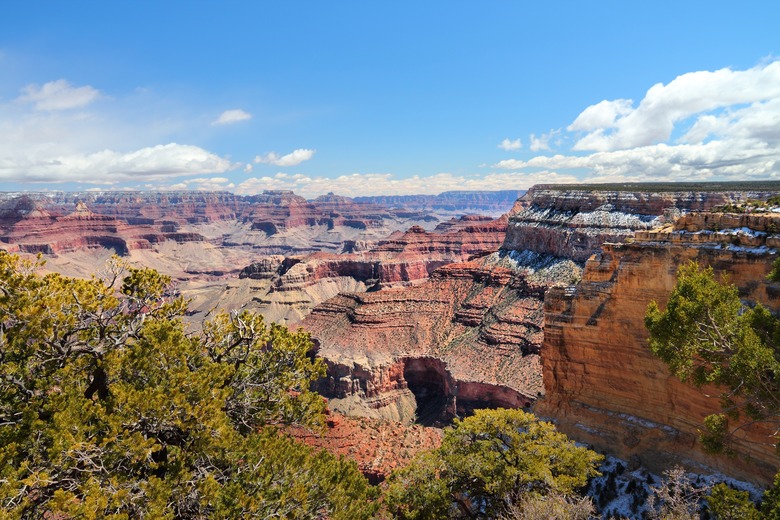How Does Erosion Affect The Earth?
Erosion is a natural process that affects all types of land on Earth, from the grandest mountains to the humblest patches of soil. Erosion is distinct from weathering, in which chemical and physical processes simply break down larger pieces of rock into smaller ones. In erosion, the portions of Earth affected are moved from their original location by forces exerted by gravity, wind, flowing water or some combination.
Erosion in the World
Erosion in the World
Erosion, whatever form it takes and whether it directly affects human endeavors or not, occurs over long periods of time, from a few years to literally millions of years. (A landslide might be regarded as "instant erosion," but would never be classified as such.)
Roads that are cut into sloped surfaces such as hillsides or mountainsides are subject to the effects of erosion. If you look at the outer edge of such a road after it has been in place for a while, you are likely to see that the shoulder is minimal to nonexistent thanks to the disappearance of soil on the downslope, whereas debris may sometimes accumulate on the inner edge.
Agriculture is both a cause of erosion though human activities such as tilling and one of the many human industries affected by it. Wind and water can carry away topsoil faster than it can be replaced.
Effects on Coasts
Effects on Coasts
Coastline erosion affects the dunes just inland from beaches, the beaches themselves, and the sand bars, spits, and barrier reefs at or below the surface of shallow waters.
Dunes can be primary (closer to the water) or secondary (farther away), and, when stabilized by a cover of vegetation, can protect areas farther inland from flooding. Dunes are usually the result of wind. When a storm surge hits the coast, the water tends to steepen the slope of the beach and increase the potential for future erosion. Ordinary waves can either result in build-up (swells) or erosion (choppy waves) of coasts, depending on the direction in which the sand is moved.
Water Erosion
Water Erosion
Erosion caused by water comes in four basic types. In sheet erosion, a relatively thin layer of soil is removed from a large area of land, so that the erosion has large breadth but little depth. In rill erosion, small, distinct channels about 2 inches deep are carved out by running water. Gully erosion is similar to rill erosion, except that the channels are shallow and wide rather than narrow and relatively deep. Finally, splash erosion, as the name implies, results from the impact of water, as with falling rain, that can move portions of soil as far as 3 feet at once.
Climate (especially amounts and intensity of rainfall), soil-surface roughness and the level of area vegetation, can all mitigate or exacerbate erosion, depending on how these various factors align.
Soil Erosion
Soil Erosion
In agriculture, soil can be moved by the natural effects of water and wind or by tillage by humans farming the land. In each case, the process of erosion involves detachment, movement and deposition of soil, in that order. Topsoil, which is high in organic material and therefore fertile, may be relocated to a different part of the tilled area or relocated off-site entirely.
As with coastal erosion, the effect of soil erosion on agricultural land depends on a variety of interrelated factors. If the soil has a cover of vegetation (which is not always feasible, depending on the exact use of farming being done) for at least part of the year, the soil is better protected against the physical effects of wind and water. In addition, downward-sloping farmland is plainly more susceptible than level land, owing to gravitational effects compounding other erosive effects. Among the various benefits of replanting forests that have been cleared by fire or human industry is helping to prevent erosion.
References
- Ontario Ministry of Agriculture, Food and Rural Affairs: Soil Erosion – Causes and Effects
- University of Nebraska Plant and Soil Sciences e-Library: Erosion
- University of California at Santa Barbara: ScienceLine: How Does Erosion Affect Us?
- New York Sea Grant: Effects of Erosion and Accretion on Coastal Landforms
Cite This Article
MLA
Beck, Kevin. "How Does Erosion Affect The Earth?" sciencing.com, https://www.sciencing.com/erosion-affect-earth-8570460/. 22 November 2019.
APA
Beck, Kevin. (2019, November 22). How Does Erosion Affect The Earth?. sciencing.com. Retrieved from https://www.sciencing.com/erosion-affect-earth-8570460/
Chicago
Beck, Kevin. How Does Erosion Affect The Earth? last modified March 24, 2022. https://www.sciencing.com/erosion-affect-earth-8570460/
